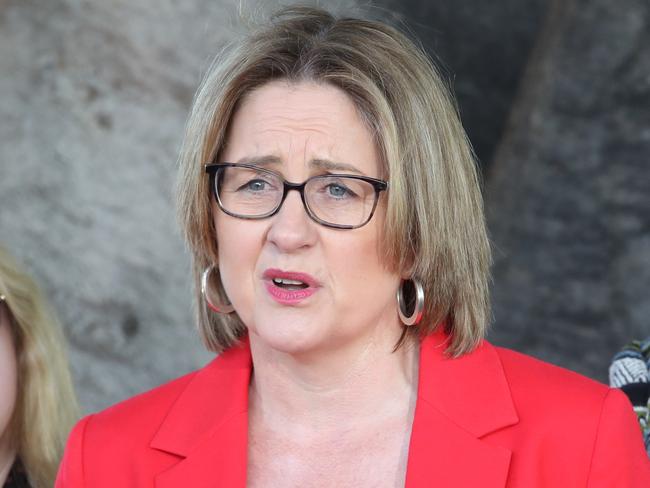RedBridge poll finds gas phase-out makes people less likely to vote for Allan government
Premier Jacinta Allan has suffered a major blow with a new poll showing 30 per cent of Labor supporters are less likely to vote for the government due to its gas phase-out plans.
Victoria
Don't miss out on the headlines from Victoria. Followed categories will be added to My News.
Labor’s plan to force households off gas is shaping as a vote killer, with almost half of people in key state electorates saying it makes them less likely to vote for the Allan government.
A new poll that will send shockwaves through the government’s marginal seatholders showed heightened concerns about the hip pocket impact of Victoria’s transition to renewables, amid the current cost-of-living crisis.
When asked if the phase-out of gas appliances would affect their vote, 48 per cent of respondents said they would be less likely to back the government, with only 14 per cent more likely to support it.
And in what will be a major blow for Jacinta Allan, 30 per cent of Labor supporters said they would be less likely to vote for the government due to its gas phase-out plans.

For respondents earning less than $1000 a week, 56 per cent said they would be less likely to back the government.
The poll, obtained by the Herald Sun, was conducted by RedBridge in late October and early November, and was commissioned by the Australian Gas Infrastructure Group, which owns and operates gas pipelines in Victoria.
It tested the views of 1012 voters across 16 seats via online panels, with an effective sample size of 899 and a margin of error of 3.3 per cent.
Seats surveyed include middle suburban electorates Ashwood, Bayswater, Glen Waverley, Box Hill and Ringwood, and outer-suburban electorates Melton, Sunbury, Yan Yean, Cranbourne and Pakenham.

All are held by Labor on margins of less than 8 per cent.
Regional electorates included Ripon, Eureka, South Barwon, Bass and Hastings, as well as Premier Jacinta Allan’s seat of Bendigo East. These are also all held by Labor, on margins between 0.25 per cent and 11 per cent.
RedBridge director Kosmos Samaras, who helped run Victorian ALP election campaigns before establishing his political consultancy business, said the low support from Labor supporters was of particular concern.
“That’s significant because when your primary vote is at 30 per cent or in the low 30s, you have got a problem,” Mr Samaras said.
“It’s a vote killer.”
While public awareness on the issue was also high – with four in five survey respondents saying they knew the government wanted to phase out gas appliances in homes and businesses – only 13 per cent were willing to pay for any home upgrades needed.
In a sign the cost-of-living crisis is hitting Victorians hard from all sides of politics, only 30 per cent of Greens voters were willing to carry the costs of switching to electric models.
A whopping 82 per cent of all respondents said they should have a choice about what appliances they had in their home.
The poll also revealed only 28 per cent of those surveyed believed they would be able to recover costs through lower bills. Most voters surveyed thought the transition to renewable sources of energy was happening at the right pace or even too slowly, but more than nine in 10 thought Victorian households shouldn’t “carry the financial burden of the shift to more renewable energy”.
And worryingly for the government, only 37 per cent of voters said they were confident Victoria’s energy supply would meet future demand – while 63 per cent were not confident or were unsure.
Mr Samaras said the poll showed the cost of being forced off gas was clearly a concern. “It’s in the middle of a cost-of-living crisis which is being felt the most in Victoria, compared to the rest of the country,” he said.
“Now you have a policy offering that means on top of all the things you have to worry about, including feeding your kids … cop this.”
The government has banned new homes requiring a planning permit from connecting to the gas network as part of a plan to achieve net zero emissions by 2045, and is now charting a course to force existing homes and businesses off the common fuel source.
Qualitative research from the focus groups shows the loss of choice was agitating many voters, particularly those from linguistically diverse backgrounds.
“I think people should be given the choice to do that and if they’re financially able to, then they can make the decision to do that,” one said.
Many were worried about associated costs, and one respondent said “if you are thinking of moving in a few years you won’t get your money back”.




